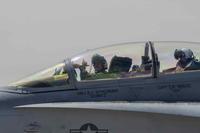Just when you thought it was safe to take a knee and run out the clock on 2011 in the hopes that the new year would be better -- it ain't.
Sandra Erwin of National Defense magazine penned a deeply pessimistic look ahead Wednesday that concluded the Pentagon's 2012 could make 2011 look like a box social by comparison. The Building will continue to cover its eyes and plug its ears about the truth of the big crunch; the services' food fights will only intensify; strategy types' lazy groupthink will persist; and cost and schedule problems are only going to worsen on the big programs.
But you could predict that about DoD any year -- the real problems, Erwin writes, will befall the defense industry. 2012 could be the year that confirms all the doomsayers' predictions about consolidations, divestitures and eliminations:
Pentagon suppliers are headed for a period of “turbulence,” says retired Air Force Gen. Charles F. Wald, director of Deloitte Services, a consulting firm. Companies will be consolidating, downsizing, shedding overhead and striving to maintain their core skills, he says.Gouré estimates that many contractors have about a one-to-two-year window to make drastic decisions, such as whether to stick around or exit the market. “You already saw companies such as ITT, Northrop Grumman and BAE Systems” shedding assets, he says. “They’ll either get out or buy up others’ assets and hope like heck that things turn around. … If you’re not in position over the next year for the beginning of the train wreck you’re going to be out of luck.”
The defense budget, however, still will be gigantic by historical standards. It is expected to stay above $600 billion (including war funding) for the next several years. But until the sequestration issue is resolved, many Pentagon contracts will be slowed down or not started, Wald predicts. “There will be pressure on large platforms. He foresees cutbacks in new ground-vehicle procurements, and a slowdown in ship construction. A replacement long-range bomber that the Air Force wants is unlikely to materialize for at least a decade.
Byron Callan, defense industry analyst at Capital Alpha Partners, says the May-September 2012 period will be “critical” for industry as it will set the tone for 2013-15 earning expectations.
“There is a natural tendency to think that 2012 could be a lot like 2011,” Callan writes in a note to investors. But 2012 could be a volatile year for the defense sector, particularly as a clearer picture emerges on who the Republican candidate could be. If Mitt Romney wins the nomination, defense stocks might trade higher, says Callan. If Republicans gain a majority in the Senate it might be a mixed picture for defense contractors as Sen. John McCain, R-Ariz., an ardent critic of defense industry, would become chairman of the Senate Armed Services Committee. Callan expects that Panetta will be leaving the Pentagon by early 2013, regardless of who wins in November.
Bottom line: The intransigence, gridlock and dysfunction that have plagued Washington will only get worse until the election -- and probably remain in effect afterward. Congressional defense advocates will battle desperately against the sequestration threat, but they didn't have enough oomph to break the logjam this year, so there's no reason to think they'll have any more luck in 2012.
Or is all this entirely too bleak? What do you think? How could the Iron Triangle get out of this ditch and get back on track?








